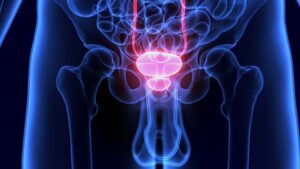A new study published in the most recent issue of the Journal of Clinical Oncology has found that plant-based diets may be useful in combatting the progression and recurrence of prostate cancer.
 Conducted by a team of researchers at the University of California and presented at the 2023 ASCO GU Cancers Symposium, the study indicates that “plant-based dietary patterns are associated with lower risk of PC progression and recurrence, particularly among older men and those who reported a higher intensity walking pace.”
Conducted by a team of researchers at the University of California and presented at the 2023 ASCO GU Cancers Symposium, the study indicates that “plant-based dietary patterns are associated with lower risk of PC progression and recurrence, particularly among older men and those who reported a higher intensity walking pace.”
As noted by the study’s abstract, for prostate cancer (PC), individual plant foods (e.g., tomatoes with lycopene) appear to reduce PC incidence and mortality. However, “less is known about plant-based dietary patterns and PC survivorship.”
For the study researchers examined 2,038 men diagnosed with T1-T3a PC who were enrolled in the Cancer of the Prostate Strategic Urologic Research Endeavor (CaPSURE) and had completed a food frequency questionnaire (FFQ) a median of 31.5 months post-diagnosis.
“Overall” and “healthy plant-based” dietary indices (PDI and hPDI, respectively,) were calculated from the FFQ. Multivariable Cox proportional hazards models estimated adjusted hazard ratios (HR) and 95% confidence intervals (CI) for associations between plant-based diets and risk of PC progression (recurrence, secondary treatment, bone metastases, or PC death) as the primary outcome, and PC recurrence as a secondary outcome.
Researchers also examined whether age, stage, grade, and walking pace modified associations.
“We observed 204 progression events (169 due to biochemical recurrence) over a median follow up of 7.4 years after the FFQ”, states the study. “Men in the highest quintile of PDI had a 52% lower risk of progression (HR 0.48, 95% CI 0.36-0.65, p-trend<0.001) and a 53% lower risk of recurrence (HR 0.47, 95% CI 0.32-0.68, p-trend<0.001) compared to men in the lowest quintile.”
Although the hPDI was not associated with PC progression or recurrence overall (p-trend >0.05), “men in the higher quintiles had statistically significant reductions in risk of recurrence.” Among men >65 years, “greater consumption of a healthful plant-based diet was associated with lower risk of PC recurrence (HR 0.41, 95% CI 0.24-0.7, p-trend=0.03). In addition, among those with a brisk/fast walking pace (>3 h/wk), men in the highest PDI quintile had a 56% (HR 0.33, 95% CI 0.26, 0.73) lower risk of PC progression, and a 59% (HR 0.41, 95% CI 0.25, 0.68) decrease in risk of PC recurrence.”
Researchers conclude by stating that “This study indicates that plant-based dietary patterns are associated with lower risk of PC progression and recurrence, particularly among older men and those who reported a higher intensity walking pace. PC survivors may be recommended diet and exercise counseling to improve clinical outcomes after PC diagnosis.
